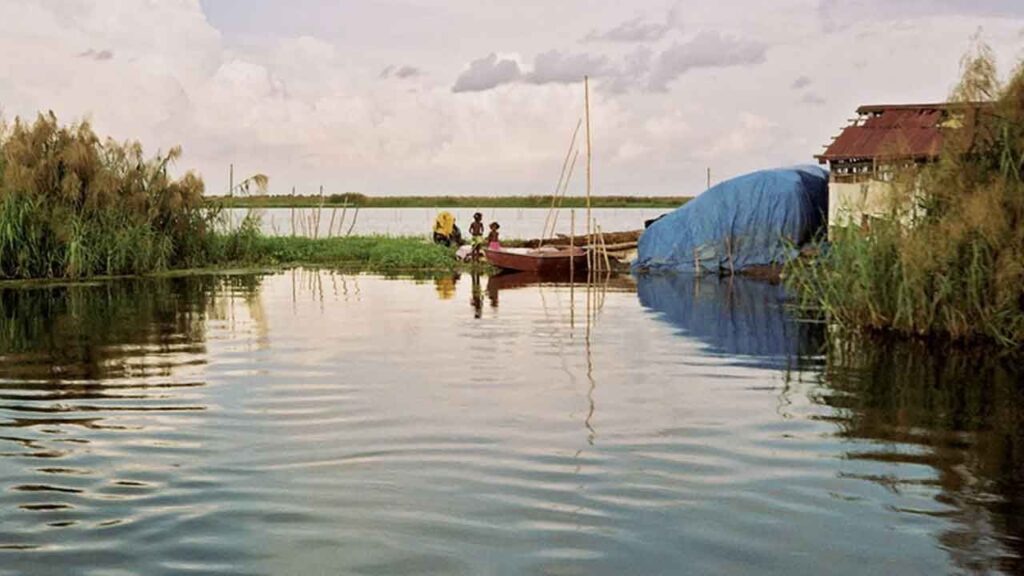Introduction
Kolleru Lake, nestled in Andhra Pradesh, India, is one of the country’s largest freshwater lakes. Situated between the deltas of the Krishna and Godavari rivers, it spans approximately 245 square kilometers, serving as a crucial habitat for diverse flora and fauna
Geographical Significance
The lake receives inflows from seasonal rivers like Budameru and Tammileru and connects to the Bay of Bengal through the Upputeru drain. This strategic positioning enhances its role in groundwater recharge and supports the agricultural landscape of the region.
Ecological Importance
Kolleru Lake is a sanctuary for migratory birds, attracting species such as the Siberian crane, ibis, and painted storks during winter months. Recognizing its ecological significance, it was designated a wildlife sanctuary in November 1999 and later acknowledged as a Ramsar site in 2002, underscoring its international importance as a wetland.
Conservation Challenges
Despite its ecological value, Kolleru Lake faces challenges including encroachments for aquaculture and agriculture, leading to habitat loss and pollution from nearby industries. These threats necessitate comprehensive conservation efforts to restore and protect this vital ecosystem.
Tourism and Community Engagement
The lake’s rich biodiversity makes it a popular destination for birdwatchers and nature enthusiasts. Local communities play a crucial role in its conservation, balancing livelihoods with sustainable practices to ensure the lake’s health for future generations.

Kolleru Lake location Andhra Pradesh
Why Kolleru Lake’s Location Matters
Ecological Balance
Kolleru Lake acts as a natural buffer, mitigating floods and supporting a diverse range of flora and fauna. Its preservation is essential for maintaining ecological balance in the region.
Economic Significance
The lake supports local economies through fisheries and agriculture. Sustainable management ensures that these resources remain viable for communities dependent on them.
Biodiversity Hotspot
As a sanctuary for migratory birds, Kolleru Lake contributes to global biodiversity. Protecting such habitats is crucial for the survival of numerous species.
Climate Regulation
Wetlands like Kolleru play a role in carbon sequestration and climate regulation, underscoring the importance of their conservation in combating climate change.
Educational and Research Opportunities
The lake offers invaluable opportunities for ecological and environmental studies, aiding in the development of conservation strategies.
Historical Context of Kolleru Lake
Ancient Significance
Kolleru Lake’s history is intertwined with ancient civilizations, serving as a resource hub for communities over centuries.
Medieval Era
During the 15th century, under the Eastern Ganga rulers, the lake region flourished, with significant cultural and architectural developments.
Colonial Period
The British colonial era brought changes in land use around Kolleru, impacting its ecology and local livelihoods.
Post-Independence Developments
Post-1947, initiatives aimed at balancing development with conservation emerged, recognizing the lake’s ecological importance.
Modern Conservation Efforts
Recent decades have seen intensified efforts to protect Kolleru Lake, focusing on restoring its ecological balance and supporting sustainable community practices.
Key Takeaways from Kolleru Lake’s Significance
| S.No | Key Takeaway |
|---|---|
| 1 | Kolleru Lake is one of India’s largest freshwater lakes, located in Andhra Pradesh. |
| 2 | It serves as a crucial habitat for millions of migratory birds, especially during winter months. |
| 3 | The lake was designated as a wildlife sanctuary in 1999 and a Ramsar site in 2002. |
| 4 | Challenges like encroachments and pollution threaten its ecological balance. |
| 5 | Conservation efforts are essential to preserve its biodiversity and support local communities. |
Kolleru Lake location Andhra Pradesh
FAQs: Frequently Asked Questions
Q1: Where is Kolleru Lake located?
A: Kolleru Lake is located in Andhra Pradesh, India, between the Krishna and Godavari river deltas.
Q2: Why is Kolleru Lake significant?
A: It is one of India’s largest freshwater lakes and serves as an important habitat for migratory birds, supporting biodiversity and ecological balance.
Q3: What is the Ramsar designation of Kolleru Lake?
A: Kolleru Lake was designated as a Ramsar site in 2002 due to its importance as a wetland of international significance.
Q4: What are the main threats to Kolleru Lake?
A: Encroachments for aquaculture and agriculture, pollution from industries, and habitat destruction are the main threats.
Q5: What conservation efforts are being made for Kolleru Lake?
A: The government has declared it a wildlife sanctuary and initiated restoration programs to protect its biodiversity.
Some Important Current Affairs Links

















